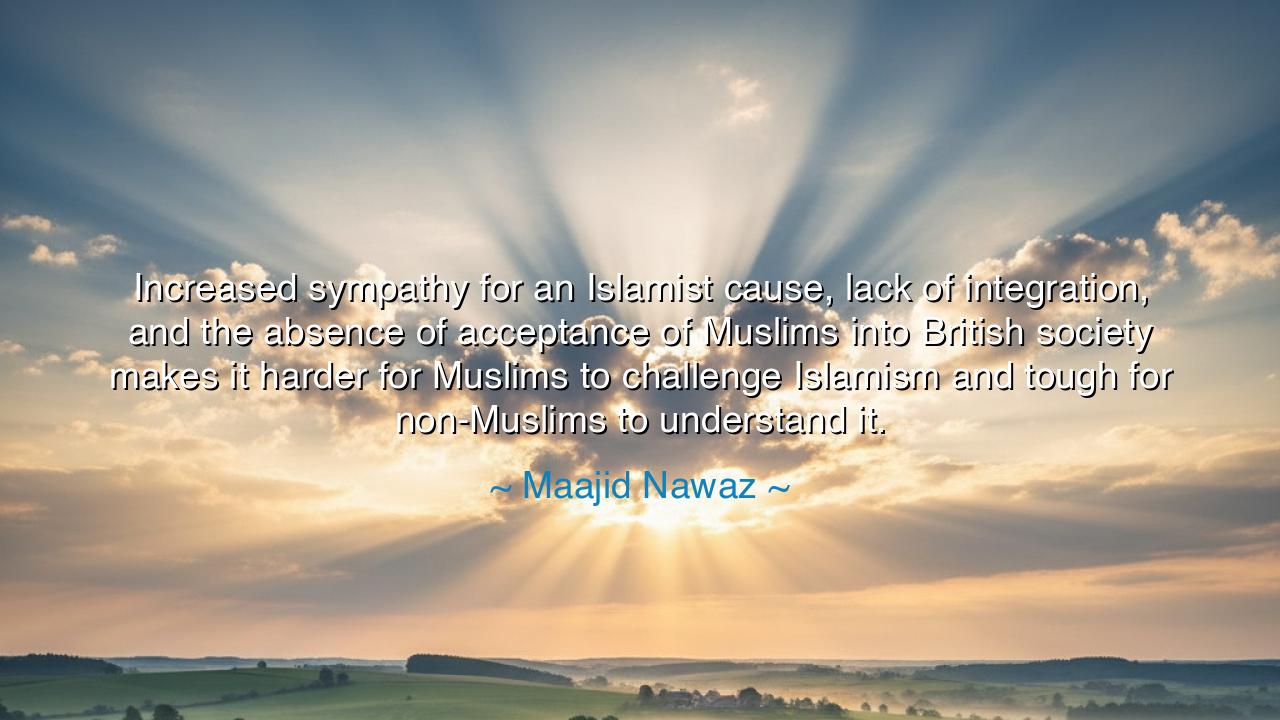
Increased sympathy for an Islamist cause, lack of integration
Increased sympathy for an Islamist cause, lack of integration, and the absence of acceptance of Muslims into British society makes it harder for Muslims to challenge Islamism and tough for non-Muslims to understand it.






Hear, O seekers of justice and harmony, the words of Maajid Nawaz, who declared: “Increased sympathy for an Islamist cause, lack of integration, and the absence of acceptance of Muslims into British society makes it harder for Muslims to challenge Islamism and tough for non-Muslims to understand it.” In this truth we hear both warning and wisdom, for it speaks to the peril that arises when divisions grow unchecked, when misunderstanding festers, and when compassion is misplaced upon causes that corrupt rather than heal.
The meaning is thus: Nawaz reminds us that sympathy—when given blindly—can become a chain that binds, rather than a light that frees. When the Islamist cause gains uncritical sympathy, it cloaks itself in the garb of righteousness, making it harder for ordinary Muslims to resist its pull. At the same time, when Muslims are held apart, denied acceptance and true belonging, the soil for extremism is made more fertile, for alienation feeds bitterness. And thus, misunderstanding reigns on both sides: Muslims struggle to oppose radicalism, and non-Muslims struggle to see beyond it.
The ancients knew this danger of misplaced sympathy and failed integration. Consider the fate of Rome, which, in its later days, drew countless peoples into its empire. Where Rome embraced them with citizenship, culture, and rights, there was unity. But where Rome excluded or mistrusted, rebellion flared, and division weakened the empire. The lesson is timeless: where inclusion is absent, division thrives; where belonging is denied, extremism finds its voice.
History gives us also the tale of post-war Germany, where, after the First World War, humiliation and exclusion bred resentment. That resentment, left unchecked, gave rise to poisonous ideologies. In like manner, Nawaz warns that without acceptance and integration, young Muslims may find themselves vulnerable to the poisonous allure of Islamism, which offers false strength in place of dignity denied. Sympathy wrongly given to that ideology strengthens it, while rejection wrongly given to individuals alienates them, leaving both communities weaker.
At the heart of Nawaz’s teaching is the call to balance: to show true compassion for people while refusing to indulge destructive ideologies. To offer belonging, friendship, and respect to Muslims as neighbors, colleagues, and fellow citizens—while rejecting Islamism as a distortion of faith—is the only path forward. Without this, both communities live in shadow: Muslims caught between alienation and extremism, non-Muslims caught between fear and misunderstanding.
The lesson for us is this: wisdom must guide our sympathy, and courage must guide our inclusion. Do not confuse people with ideologies, nor kindness with indulgence. When you meet your neighbor, see the human being before you, not the banner of ideology. When you confront harmful ideas, resist them with clarity and firmness, but never extend that condemnation to those who, by circumstance, share only a name or a background. For justice without compassion is cruelty, and compassion without justice is blindness.
What, then, should you do? In your daily life, reach out to those who feel excluded; listen to their stories, and offer them dignity. When harmful ideologies arise, speak truth against them, but do so with discernment, never condemning entire peoples for the actions of a few. Educate yourself about the difference between faith and extremism, so that you may stand firm without falling into fear or hatred. In this way, you strengthen the bonds of society, protect the vulnerable, and weaken the call of extremism.
Thus let Maajid Nawaz’s words echo as warning and guide: “It makes it harder for Muslims to challenge Islamism and tough for non-Muslims to understand it.” For in them lies the timeless wisdom that peace is not won through suspicion, nor through blind sympathy, but through understanding, inclusion, and courage. And if you heed this, your society will not be divided by fear, but united by justice, strength, and mutual respect.






AAdministratorAdministrator
Welcome, honored guests. Please leave a comment, we will respond soon